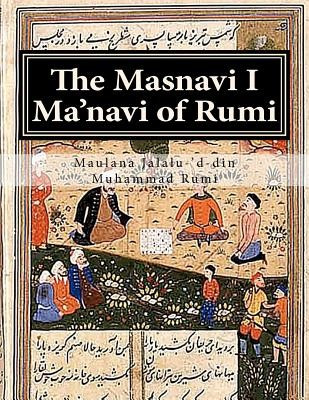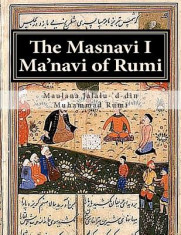The Masnavi I Ma'navi of Rumi: Complete 6 Books
Cost unic de transport la toate comenzile acestui vanzator
-
Produs:Nou, Ofer garanție, Cu factură
-
Numar articol:187905228
-
Disponibilitate:Indisponibil
-
Preț:78,00 Lei
-
Anuntul a expirat la:22.12.2020, 14:10
-
Ai o nelamurire?
-
Vandut de:
-
Vinde si tu:Pune in vanzare un produs ca acesta
-
Optiuni:
Descriere
Vânzatorul este direct răspunzator pentru produsul afișat în această pagină.
Disponibilitate: Indisponibil - Vezi produse similare
Specificatii
The general theme of Rumi's thought, like that of other mystic and
Sufi poets of Persian literature, is essentially that of the
concept of tawhid - union with his beloved (the primal root) from
which whom he has been cut off and become aloof - and his longing
and desire to restore it The Masnavi weaves fables, scenes from
everyday life, Quranic revelations and exegesis, and metaphysics
into a vast and intricate tapestry. In the East, it is said of him
that he was not a prophet - but surely, he has brought a scripture.
Rumi believed passionately in the use of music, poetry, and dance
as a path for reaching God. For Rumi, music helped devotees to
focus their whole being on the divine, and to do this so intensely
that the soul was both destroyed and resurrected. It was from these
ideas that the practice of whirling dervishes developed into a
ritual form. His teachings became the base for the order of the
Mawlawi which his son Sultan Walad organized. Rumi encouraged sama
listening to music and turning or doing the sacred dance. In the
Mevlevi tradition, sama represents a mystical journey of spiritual
ascent through mind and love to the Perfect One. In this journey,
the seeker symbolically turns towards the truth, grows through
love, abandons the ego, finds the truth, and arrives at the
Perfect. The seeker then returns from this spiritual journey, with
greater maturity, to love and to be of service to the whole of
creation without discrimination with regard to beliefs, races,
classes, and nations. In other verses in the Masnavi, Rumi
describes in detail the universal message of love: The lover's
cause is separate from all other causes Love is the astrolabe of
God's mysteries. Rumi was an evolutionary thinker in the sense that
he believed that the spirit after devolution from the divine Ego
undergoes an evolutionary process by which it comes nearer and
nearer to the same divine Ego. All matter in the universe obeys
this law and this movement is due to an inbuilt urge (which Rumi
calls love) to evolve and seek enjoinment with the divinity from
which it has emerged. Evolution into a human being from an animal
is only one stage in this process. The doctrine of the Fall of Adam
is reinterpreted as the devolution of the Ego from the universal
ground of divinity and is a universal, cosmic phenomenon. The
French philosopher Henri Bergson's idea of life being creative and
evolutionary is similar, though unlike Bergson, Rumi believes that
there is a specific goal to the process: the attainment of God. For
Rumi, God is the ground as well as the goal of all existence.
However Rumi need not be considered a biological evolutionary
creationist. In view of the fact that Rumi lived hundreds of years
before Darwin, and was least interested in scientific theories, it
is probable to conclude that he does not deal with biological
evolution at all. Rather he is concerned with the spiritual
evolution of a human being: Man not conscious of God is akin to an
animal and true consciousness makes him divine. Nicholson has seen
this as a Neo-Platonic doctrine: the universal soul working through
the various spheres of being, a doctrine introduced into Islam by
Muslim philosophers like Al Farabi and being related at the same
time to Ibn Sina's idea of love as the magnetically working power
by which life is driven into an upward trend.
Modalitati de livrare si plata
LIVRARE
PLATA
- - Ramburs
Politica de retur
- - Produsul nu se poate returna.




